Homecoming traditions
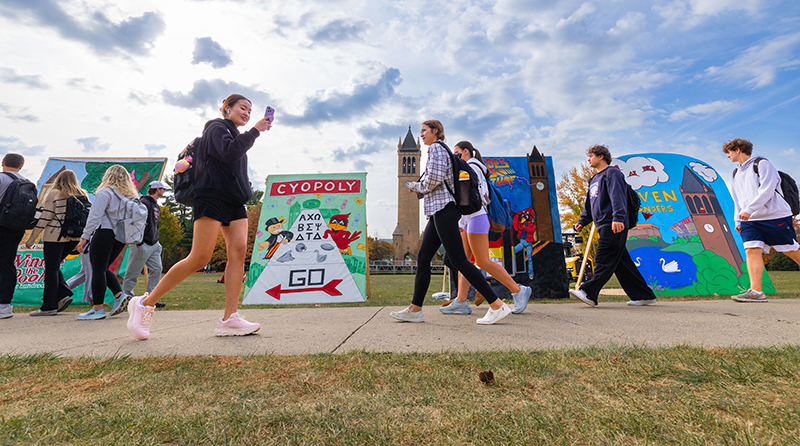
Photos by Christopher Gannon.
It's Homecoming week at Iowa State. The annual celebration started Sunday with a kickoff event and students painting "Victory Lane" below the pedestrian bridge on the east side of Jack Trice Stadium, and continues through football game-related activities on Saturday. Homecoming includes other traditions, such as an awards ceremony Friday afternoon (1:30 p.m., Stephens Auditorium). More than 40 alumni and friends will be recognized by the university and the colleges for their impact on the university and/or in their communities.
(above) Students look over Homecoming banners Monday on the central campus sidewalk north of the campanile. (below) Members of Delta Tau Delta and Beta Sigma Psi fraternities and Alpha Chi Omega sorority perform their skit during Monday afternoon's first round of the Homecoming student spirit competition, Yell Like Hell. A semifinal round took place Wednesday evening, and a small set of teams will compete in the final round during the Homecoming pep rally Friday evening outside the Alumni Center.
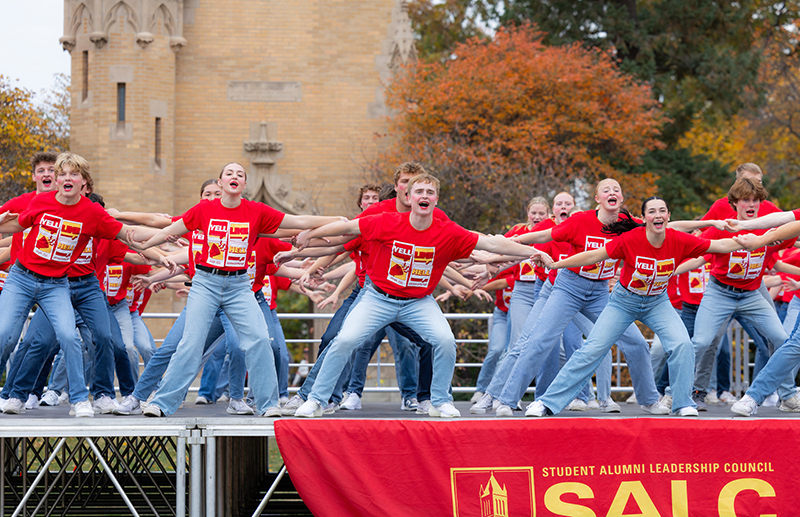
One-day vaccine clinic is Nov. 7
Iowa State faculty and staff members wanting to stay current with multiple vaccines have a one-day option to receive a COVID-19 and flu vaccine in a single visit. ISU WellBeing, occupational medicine and Hy-Vee will offer a COVID-19 booster, a regular flu vaccine and a high-dose flu vaccine during an employee clinic on Thursday, Nov. 7 (9 a.m.-3 p.m., 1218 State Gym).
The vaccines are available for these employee groups:
- Faculty, professional and scientific, merit and postdocs
- University child care centers
- Retirees on the university health plan who are not yet 65
- ISU Foundation
- Iowa State Daily
The regular flu shot has no cost to benefit-eligible employees. No appointment or registration is needed, and participants will check in electronically with their ISU ID number when they arrive.
Online registration is required for the COVID-19 booster and high-dose flu vaccine prior to the clinic. Both will be provided by Hy-Vee pharmacy, with the cost covered through ISU insurance. Those with other insurance should contact your provider to verify coverage.
The Moderna and Pfizer COVID-19 vaccines will be available. Employees receiving the COVID-19 or high-dose flu vaccine also should bring their university ID and insurance cards.
The high-dose flu vaccine is for those 65 years and older. To register for the high-dose version, select “Flu Vaccine” from the menu. Those 65 and older on Medicare are asked to bring their Medicare B card with them. The Center for Disease Control and Prevention does NOT recommend receiving both the regular and high-dose flu vaccines within the same flu season.
Employees are asked to wear a loose fitting shirt and enter State Gym through the south corner of the building. Parking will be available in the general staff lot (Lot 1) south of the building, including a limited number of free reserved spaces close to the building. CyRide also stops next to State Gym on Union Drive.
For more information, contact wellbeing@iastate.edu.
Spalding will continue as VP for economic development, industry relations
David Spalding has agreed to continue in his role as vice president for economic development and industry relations (EDIR) after he steps down next year as dean of the Ivy College of Business.
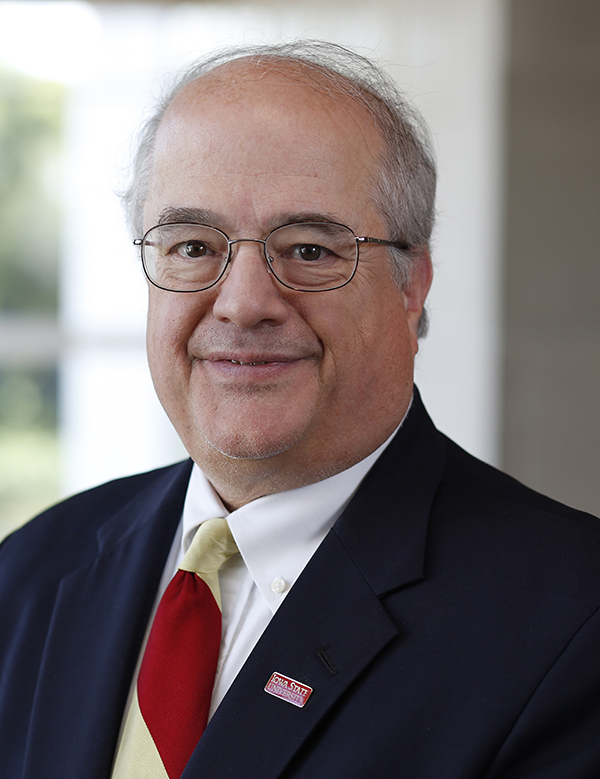
David Spalding
On July 1, 2025, Spalding will begin a 60% appointment as vice president of EDIR.
"I was pleased to learn that David will continue his excellent service to the university in leading our economic development efforts," said President Wendy Wintersteen. "Thanks to his work, we continue to expand the ways we engage with external partners, connecting them to ISU experts and resources they need to succeed."
Spalding, the Raisbeck Endowed Dean of the Ivy College of Business, announced plans in May to retire during the summer of 2025. He is the longest serving business dean in Iowa State history.
For six years, Spalding served dual roles as dean and vice president of EDIR. Last year he was appointed to lead EDIR after five years on an interim appointment. Earlier this year, Spalding served three months as interim senior vice president of operations and finance until Sean Reeder was hired for that position. Reeder began his duties Sept. 3.
The search for Spalding's successor as the Raisbeck Endowed Dean of the Ivy College of Business began in September, co-chaired by Dan Grooms, dean of the College of Veterinary Medicine, and Ann Marie VanDerZanden, associate provost for academic programs.
The office of economic development and industry relations helps external stakeholders harness Iowa State's unique capabilities and services, including the Center for Industrial Research and Service, Iowa Small Business Development Center, ISU Research Park, office of innovation commercialization and Pappajohn Center.
Eyewear benefit offers more coverage in 2025
The Avesis eyewear plan (PDF) is one of the optional benefits available to Iowa State employees during open enrollment, which begins tomorrow, Nov. 1. Employees who wear glasses or contact lenses but haven't opted for the coverage in the past are encouraged to consider it for 2025 before open enrollment closes Nov. 22.
Open enrollment
Nov. 1-22 in Workday
For the plan year that begins Jan. 1, Iowa State's Employee Benefits Advisory Committee negotiated more generous Avesis coverage on lens enhancements, with modest premium increases -- from a 47-cent increase/month for employee-only coverage to a $1.73 increase/month for family coverage.
"We received some comments in the [Fall 2022] benefits survey requesting a richer eyewear plan, so that's something we pursued for the 2025 plan year," said benefits manager Ed Holland, university human resources. "The intent was to make changes to the coverage without significantly raising the premium."
Avesis premium (monthly)
|
Who's covered |
Plan year 2025 |
Current |
|
Employee |
$7.14 |
$6.67 |
|
Employee and spouse |
$13.29 |
$12.58 |
|
Employee and children |
$15.04 |
$13.77 |
|
Employee and family |
$19.44 |
$17.71 |
Full coverage on common lens enhancements
The key change in the 2025 Avesis plan is full coverage of a handful of eyewear lens enhancements: polycarbonate (vs. a standard plastic), scratch-resistance, anti-reflective, ultra-violet screening and tinting. The combined retail value of those five enhancements is about $268. This year, employees who selected any of those lens upgrades paid half of their retail price; in 2025 they won't pay anything.
Based on 2023 claims submitted by ISU employees, Holland said the additional savings to employees in 2025 on those five lens enhancements would exceed $180,000.
Robust eyewear network
In 2025, the Avesis plan covers one pair of glasses per year for all covered employees and family members; the same as 2024. Coverage on frames and the lenses themselves won't change in 2025.
Contact lens coverage also remains unchanged in 2025: full coverage for medically necessary contacts and a $130 annual benefit on elective contacts, with a 10% discount on costs exceeding $130.
The Avesis eyewear network in central Iowa provides employees many options. Within a 20-mile radius of Ames are more than 15 in-network providers, including McFarland Eye Center, Vogue Vision, Walmart Vision Center, Eye Works, Wolfe Clinic, Whylie Eye Care Center, Boone Vision Center, Polk City Eyecare, Pearle Vision, Vision 4 Less, the Huxley and Nevada Vision Clinics and more.
Testing center upgrades improve student experience, expand possibilities
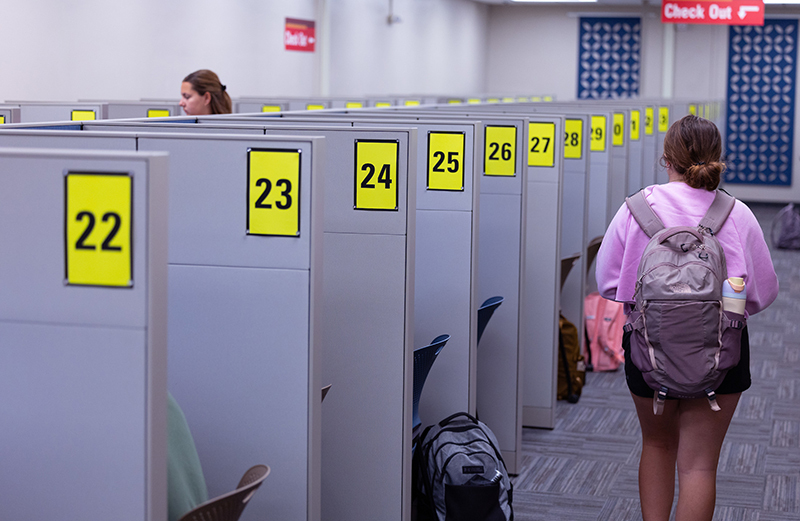
(above) Visual distractions are greatly reduced in the remodeled testing center at 0060 Carver. (below story text) Two of Iowa State's testing centers are still equipped like 0250 Carver, with computer stations at long tables and the checkin-checkout processes completed with the proctor in the testing space. Photos by Christopher Gannon.
Upgrading the testing center location in the basement of Carver Hall and moving another from Durham Center to the Hixson Lied building on the east side of campus has improved the test-taking environment for students. These changes also give a boost to the ISU Testing Center's eligibility to proctor professional licensure or graduate school admission exams, another useful and convenient service for students.

"We would love to be the one that can help them get over that last hurdle -- or the next hurdle -- in their education, provide access and remove some of those barriers," said Joel Hochstein, ISU Testing Center manager since late 2022. The testing center is part of the Center for Excellence in Learning and Teaching.
For its capstone project, a faculty-staff team in this year's Emerging Leaders Academy is investigating what some of those immediate-need, high-impact exams might be. That study should wrap up by April.
A renovation and a relocation
The Carver testing site was selected for renovation due to its high traffic. Of approximately 120,000 course exams the testing center proctors each year, historically 40% happen in 0060 Carver, Hochstein said.
Strategic Plan support
- FY24 funds: $550,000 (largest award)
- FY25 funds: $80,000
A fiscal year 2024 strategic plan award, partially renewed for this year for a total of $630,000, paid for numerous improvements in the room that reflect best practices:
- New cubicles and furniture create lower-distraction testing stations. Students needing a low-distraction accommodation may now use the renovated testing locations or continue using Student Accessibility Services' exam accommodations center in Hixson-Lied.
- Part of the adjacent staff office space was converted to move the check-in and check-out functions outside the testing space, eliminating that distraction.
- Electronic lockers (student ID-activated) were installed in the hallway so bags, backpacks and coats stay outside the testing room.
- More than 30 ceiling cameras were installed (replacing one for the room) so proctors can monitor student progress in every cubicle.
- Ethernet wiring to the testing stations was replaced.
- A card-reading room access system will be completed this semester, and students won’t be able to enter the testing room without staff assistance.
- A separate area of five testing cubicles can accommodate exams with specific access restrictions and serves as a starting point for adding third-party exams.
The same features are in a new testing center location in 2242 Hixson-Lied Student Success Center completed this summer with $400,000 in provost office funds. The two renovation projects are part of notable improvements in the testing center the last two years that include:
- Replacing two legacy software systems used separately by faculty or students with a leased system that combines scheduling and administrative functions.
- Implementing safety and security recommendations that emerged from a walk-through of the testing center with ISU police officers. Restricting room access is one example.
A role in workforce development
Hochstein said he's also investigating how the testing center can find a role in developing Iowa's workforce by offering third-party exams in the campus locations. This would require contracts with test vendors, which offer hundreds of academic and professional exams.
Testing Center sites
- 0060 Carver, 63 seats
- 0250 Carver, 56 seats
- 2552 Gilman, 65 seats
- 2242 Hixson-Lied, 57 seats
"There's a demand from people in this area who need to reskill, people who need to upskill, people who want to advance their professional career and need some certifications to do that," he said. "They could do that here with us, and not have to go to Ankeny or Fort Dodge or Sioux City," he said. "I think this is an important niche we can fill --and it becomes a potential funding stream for us."
Iowa State alumni could be another audience that uses future testing center services.
The testing center's primary focus would remain on academic exams, Hochstein said. It would schedule third-party exams during low-volume times for ISU course exams, for example, early in the semester, between terms or Mondays.
Certification with the National College Testing Association also is on Hochstein's to-do list, but that will require more time and funding, primarily to address two criteria: check-in, check-out functions must be moved outside the testing space at the other two campus locations; and an NCTA requirement that only full-time staff proctor exams. Iowa State's testing center employs about 105 part-time student proctors, but Hochstein said the association is revisiting this requirement.
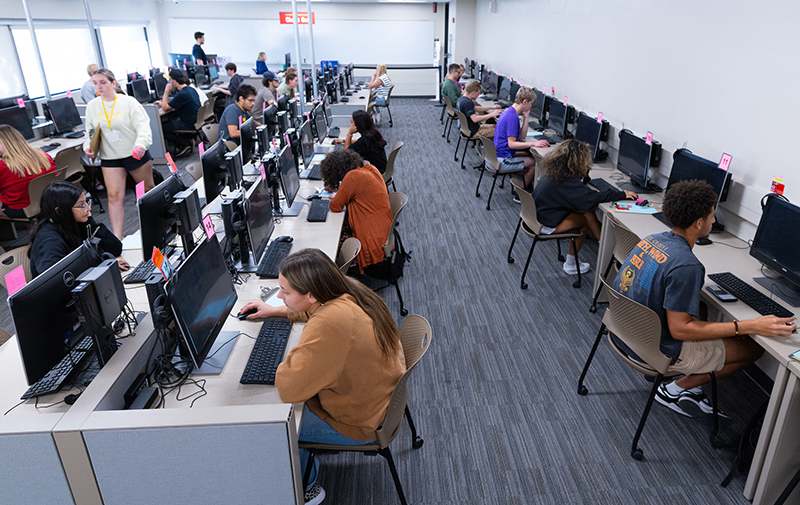
Five questions with the chief information security officer
October is cybersecurity awareness month. As we close out the month, chief information security officer Rich Tener answers five question about password security.
Is it safe to use meaningful words -- like your birth month -- in a password? Or should I be using random characters?

Rich Tener
The important part of choosing a password is to make it hard to guess. You can use your birth month in your password, but keep in mind that a lot of personal information about you is available to hackers. If you do use some of it in your password, be sure to also include something that isn't easy for a hacker to discover publicly. You don't need to compose your password using all random characters, but making it longer makes it more secure -- so consider using a passphrase and worry less about special characters and complexity.
At Iowa State, we still require you to use numbers, mixed case and special characters. Outside of ISU, you should use a different password on each non-ISU site. When hackers find one password, they'll test it against every other site they can to see if it works.
My university password gives me access to apps like ISU Outlook, Workday and Canvas. Is this considered password reuse?
No. An example of password reuse is using the same password for multiple personal sites or apps, like Ticketmaster and Amazon Prime. Also, you should never reuse your Iowa State password as a password for personal accounts.
With different passwords for everything, how do I remember them all?
I recommend using a password manager app. These apps store all your passwords in a secure way, make them available across all your devices and only require you to remember one good password to unlock them. Options include:
- Dashlane
- 1Password
- Bitwarden
- LastPass
- Keeper
- NordPass
Avoid storing password information in an email to yourself, in the event your email would become compromised. Also don't put password information in an online document platform -- like Google Docs -- for the same reasons.
My browser always asks to save the passwords I enter into sites. Is this safe?
While this is convenient, not all browsers protect your passwords as well as a password manager does. If you leave your computer unlocked or share your computer with someone else, whoever else is using your computer can log in as you to any site. Apple, Microsoft, Mozilla and Google are constantly making improvements to how they manage passwords. For now, a better option is to find a password manager app you like and using that instead.
How do I know if my university password has been compromised?
The information technology security team uses tools that continuously monitor online security. If a situation seems suspicious, a member of the team will investigate further, take action to protect your password and contact you directly. If you suspect your password is compromised, you can contact the team at security@iastate.edu.
ISU Theatre delves into opera
Are you looking to enjoy the holiday spirit early this year? ISU Theatre, ISU Symphony Orchestra and ISU Opera Studio's "Die Fledermaus (The Bat)" offers an effervescent evening out at the opera -- with gorgeous music, gemstone-hued ballgowns and the glitz and glamour of a late 19th century Viennese palace.

"Die Fledermaus (The Bat)"
Set in 1899 during a New Year's Eve masked ball, "Die Fledermaus" is a farce of mistaken identity, love, forgiveness, flirtation and a practical joke with unforeseen consequences. Composed by Johann Strauss II and performed in English with a two-hour runtime, the show opens in Fisher Theater on Thursday, Nov. 7, and runs for one weekend.
The production is led by Chad Sonka, music and theatre associate teaching professor and stage director, and Jodi Goble, music and theatre teaching professor and music director.
Performances begin at 7:30 p.m. Nov. 7-9, with a matinee performance at 2 p.m. on Nov. 10. Tickets are $25 general admission and free for youth and students. Tickets can be purchased at the door, through the Iowa State Center ticket office in Stephens Auditorium or Ticketmaster.
From operettas to American musical theatre
One of the most popular operas in the world, "Die Fledermaus" is performed often in both professional and university settings. As an operetta, the show is perfect for audiences who may be new to opera as an art form. In contrast to lengthy, grand operas, operettas often sparkle with satire and lightheartedness, and mistaken identity plots abound. Sonka said that if the operetta feels familiar to an American audience, there's a good reason.
"The operetta genre is the grandfather of what we would now call American musical theatre," he said. "So, shows like 'The Sound of Music' or 'Carousel,' in terms of structure, have their birth in something like 'Die Fledermaus.' When people go see it, they recognize something like 'Oklahoma.'"
Jacob Harrison, associate professor of music at Texas State University and former Iowa State music faculty member, will conduct the ISU Symphony Orchestra.
Entertainment and education
Sonka said "Die Fledermaus" is well-suited to giving students a rich educational experience and a resume-worthy professional credit.
The lead female roles are double cast, meaning one set of actors will perform those roles Thursday and Saturday and another set on Friday and Sunday. This structure gives students the professional experience of collaborating with a counterpart on staging and blocking and helps them hone their skills of self-discipline and responsibility.
"Many of the leads you'll see are going on to become music teachers," Sonka said. "We try to teach them the process of show preparation. Then, when they have to produce their school's musical in a few years of their teaching, they have a basis of process to do so."
The 'total art'
Sonka said his favorite part of the show happens during act two when the curtain rises on the palace of Prince Orlofsky. Rob Sunderman, former Iowa State scenic designer, has returned to Fisher Theater to design a Viennese ballroom with a grand staircase and chandelier. It will be an opulent setting for ballroom dancing, and choreographer Valerie Williams plans to have the cast showcase many dance styles.
Kelly Marie Schaefer, teaching professor and the show's costume designer, is working alongside student assistant designers Stephanie Wessels and Kale Block and costume shop supervisor Doris Nash to produce costumes worthy of a lavish, Gilded Age-era New Year's Eve ball. Drawing inspiration from a gemstone-hued color palette, the team designed eight new ballgowns for this show, in addition to other costumes.
